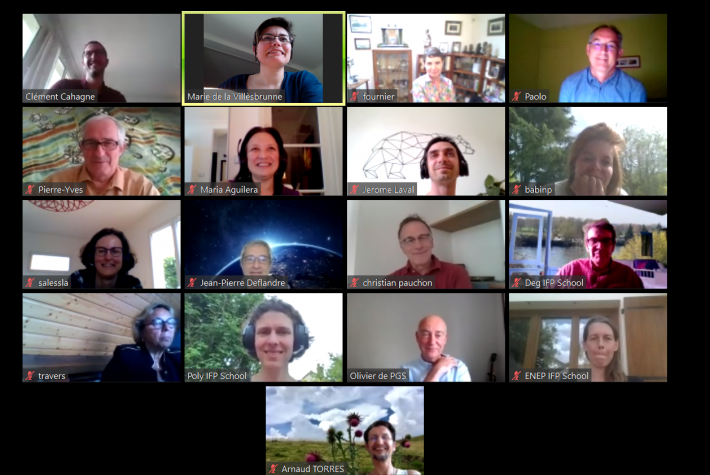
Reassuring worried students and partners, answering numerous questions, preparing more than 900 hours of virtual classes…We can only salute the incredible mobilization of IFP School teachers over the last few weeks.
As soon as IFP School closed on March 16, they quickly mobilized to support the students and offer them remote learning solutions in order to continue their education.
Thierry Bros, an external lecturer, started remote teaching at the end of March. "I gave my first virtual class. Thank you IFP School for organizing this. It was a great experience !" he notes.
Ensuring the continuity of teaching during lockdown is a major challenge, especially if there is already a great deal of demand, in particular when recruiting the next year's class.
"It's a challenge for us, but we're motivated!" exclaims Paolo Paron, Supervisor of the Energy and Powertrains program.
"Distance learning cannot be improvised. We are constantly exchanging with external lecturers and our students" adds Olivier Lerat, Supervisor of the Petroleum Geosciences program. "It's more than a full-time job!"
Support ot the Lab'Innov
The situation is indeed far from being simple given the multiple tasks and sustained pace. But the teachers have been able to rely on the Information Technology Hub and Lab'Innov, the innovation laboratory recently created at IFP School.
Among other things, the Lab'Innov team offers them weekly webinars to help them progress with the digitization of training courses, master the available technical solutions, but also implement best practices.
To allow them to recharge their batteries, the Lab'Innov team also launched "Les cafés du confinement", virtual spaces for conviviality.
"We're here to support our colleagues, but also to listen to them!" notes Marie de la Villèsbrunne, Educational Designer at Lab'Innov.
Despite this unprecedented context, IFP School has been able to bounce back thanks to the long-standing commitment of its teachers in the implementation of innovative teaching methods.
"Thanks to everyone's good will, we were able to adapt quickly. Our external speakers are also supportive" notes Sébastien Bianchi, Supervisor of the Energy and Markets program. "I also have great admiration for the commitment of our students."
Innovative teaching tools
Many teachers have had to completely redesign their courses using tools such as Zoom, Microsoft Teams, Wooclap and YouTube. This was the case of the teachers of the Executive Master of Management in Energy, program taught in English in partnership with the BI Norwegian Business School.
The program started 100% remotely on March 16 with participants scattered from China to Brazil. The teachers taught their courses via Zoom and made sure that they were recorded. They used Microsoft Teams for collaborative work on projects. Finally, they worked in sub-groups via Zoom and WhatsApp to better support the students.
"When the Covid-19 crisis led countries into lockdown, my classmates and I were convinced that the Executive Master of Management in Energy would be postponed" says Waldemar Szemat Vielma, a student and delegate of the program.
"The teachers did what was necessary to offer us a plan B and continue with the initial schedule. The result exceeded our expectations!" he says.
At a distance exams and virtual reality
Given the current health measures, teachers have also adapted the organization of examinations and field courses. IFP School has set up four forms of evaluation: projects and oral exams (given at a distance through videoconference), multiple-choice questionnaires (online and open for a given period) and traditional exams carried out under virtual supervision following the recommendations of the Ministry of Higher Education, Research and Innovation.
Essential for applied training programs, certain field courses have been maintained thanks to the use of virtual reality.
Students in the Energy and Processes and Petroleum Engineering and Project Development programs took part in "School Lanta", a day of virtual tests at an industrial site.
"We can't completely replace a field course, but virtual reality allows us to transports students on site" explains Olivier Bernaert, Head of Lab'Innov.
"We ensured that the course would not only be instructive, but fun as well. The students had to do a virtually visit of the various units of the industrial site and answer a quiz at the end of each challenge. In order to make this day a real event, we proposed additional puzzles and games and kept a ranking via Teams" he adds.
If students miss their face-to-face courses, they are happy to continue their studies remotely. "With virtual classes, we have many more projects and exercises and can work more efficiently than with the old evaluation system" says Fernanda Campos Furtado, a Brazilian student in the Petroleum Geosciences program.
Her Colombian classmate, Carolina Castaño Uribe, is also satisfied: "Our teachers are making great efforts to continue teaching at a distance. They have had to deal with several connection and licensing issues, but have managed to ensure that participation and interactivity flourish."
In addition to distance learning courses, IFP School teachers also ensure that their students are not demotivated by offering them "classroom life hours" to exchange with them.
"We're more vigilant not to leave anyone behind," notes Céline Pierre, Supervisor of the Processes and Polymers program.